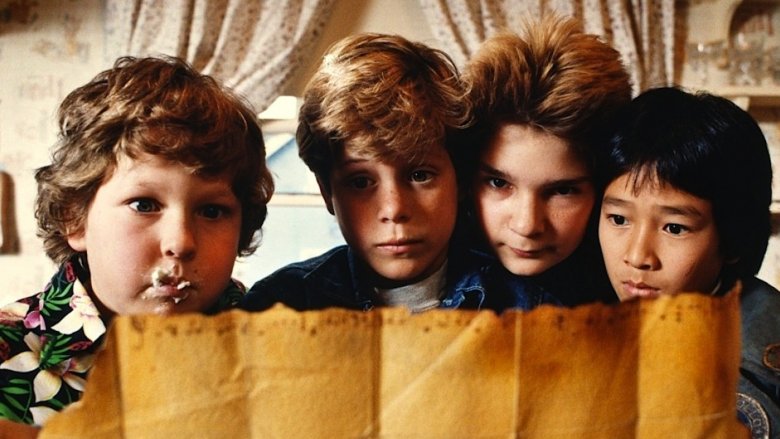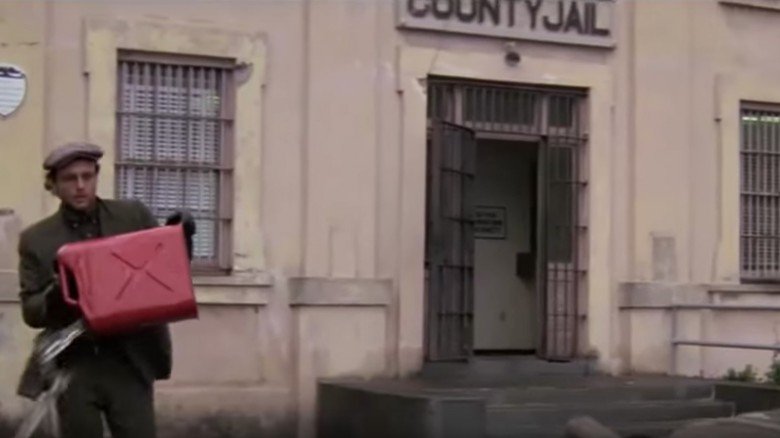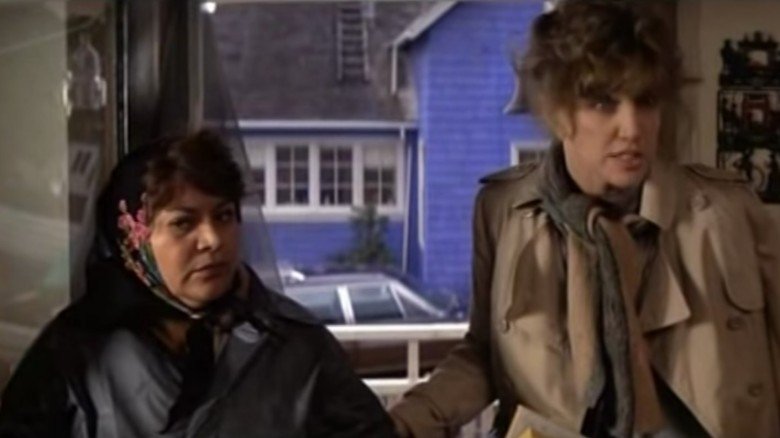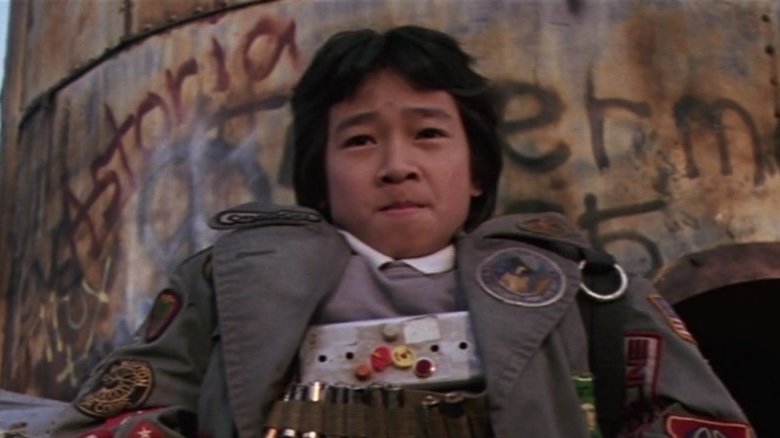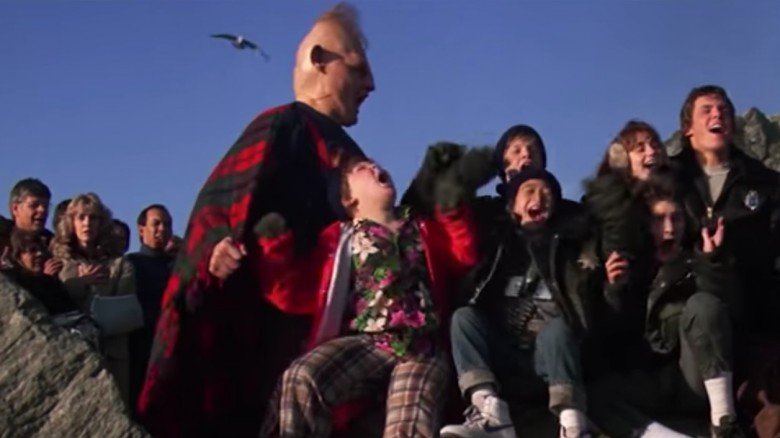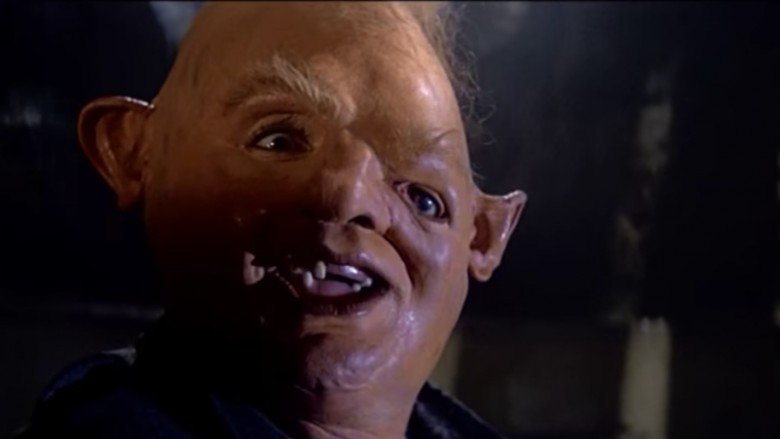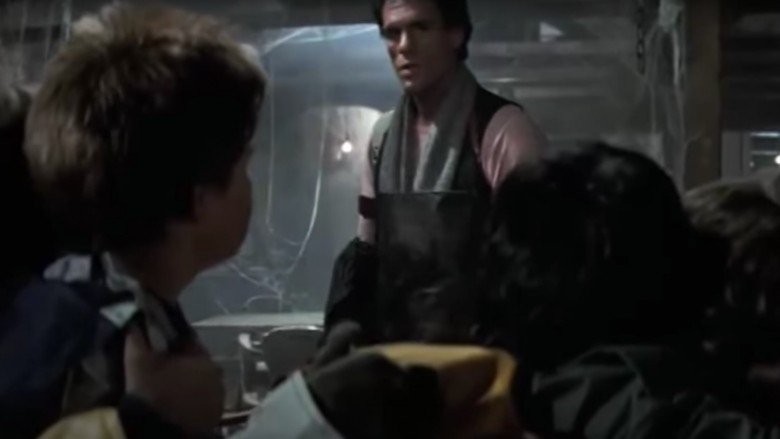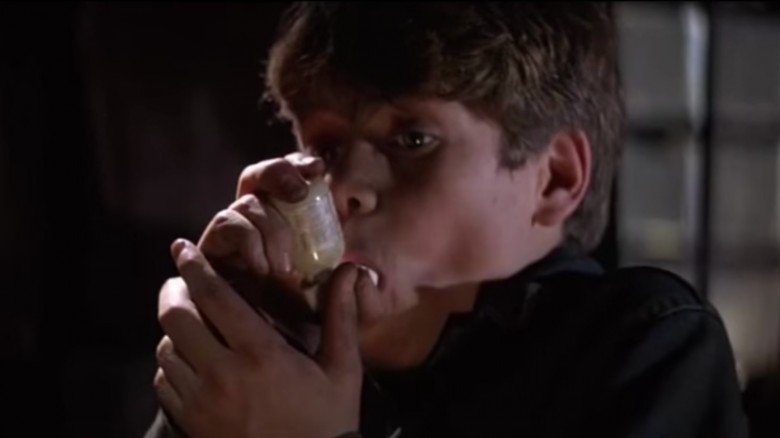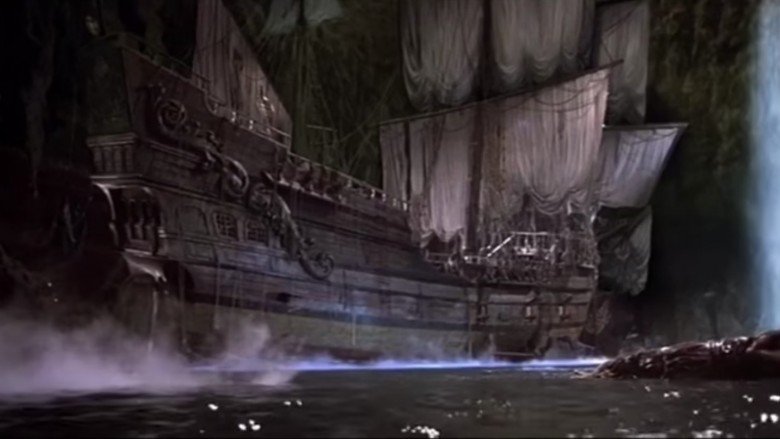The Dark Truth Behind The Goonies
In 2017, there are more than a few things you kind of have to ignore to enjoy a rewatch of the Goonies. There were, frankly, some horrible things (and silly errors) that were passed off as humor, that sullies an otherwise fantastic story. As much as it pains us to rip open a classic, here is the dark truth behind The Goonies...
The film makes the police look like complete morons
The movie opens with a lone police officer calling lunch time in a jail. Points for the fact that he calls them "turkeys," but it doesn't make much sense that one lone cop would be in charge of a bunch of prisoners. It makes even less sense that, when the officer walks into the cell and sees Jake Fratelli's hanging "corpse," he wouldn't call for backup, like, stat.
If that's not enough, his brother Francis is busy pouring gasoline outside the county jail. Does nobody look out the window at this jail? Jake walks right out the front door, and it's not until he scrambles to get in the car that a few policemen come outside, pulling on their coats. Francis shoots the gasoline trail, and a CAGE OF FIRE blazes up, preventing the police from giving chase. At least this time, someone had the presence of mind to call for backup, but the Fratellis conveniently drive past every major character (and then enter a beach ORV race that they inadvertently win, because of course).
But it was the '80s. A big car chase to start things off was sort of par for the course, and it was easy to overlook the unrealistic police action when you're a kid and ready for a good pirate story. However, the Fratellis do hole up in the old restaurant that has the entrance to the tunnels, and while the feds find them (and are killed by them), the local cops are nowhere to be found. What, did they forget? Unflattering representations of law enforcement abounded in the 80's, and The Goonies simply turned it up to eleven..
Mrs. Walsh is a dangerously terrible judge of character
Not only is Mrs. Walsh turning the packing of her home over to Rosalita, a complete stranger, and not only is she turning it over to someone who doesn't speak her language, she's also trusting the word of a translator who's clearly screwing with the hired help and doesn't once call him out on it. Seriously, is there anyone Mrs. Walsh doesn't trust whole-heartedly?
Rosalita's looks of confusion and horror, as a Eddie Haskell-imitating Mouth mistranslates Mrs. Walsh's instructions into terrifying false facts about the drug culture, and sexually deviant habits, of the Walsh family, should've been a red flag for Mrs. Walsh. But she doesn't seem to notice Rosalita's reactions at all — she just keeps rattling on about how Rosalita should put things in cardboard boxes (there are no cardboard boxes anywhere), and then tells Rosalita that she will be "very happy here."
Yeah, probably not. After everything Mouth said to her, Rosalita should've run straight out the door. Seriously, how horrible could her life have been for her to stay in that loony bin? And if she does stick around, how many times does Mouth show up to mess with her head even more? It's not like Mrs. Walsh is ever going to figure out what's going on.
Then there's the wanton racism
It's pretty clear that Rosalita wasn't exactly the most delicate portrayal of a Mexican-American character. That's just the tip of the racially insensitive iceberg, however. Think about poor Jonathan Ke Quan as Data — a smart, tech-savvy kid who's only that way because he's Asian. His English is heavily accented, and jokes come at the expense of how he pronounces certain phrases. Then there's the super, duper Italian Fratellis, with their mobster-like criminal activities and brother Jake's opera singing. Robert Davi, who played Jake, is actually an accomplished, trained opera singer, so that at least made the stereotyping pleasant to hear..
The insensitive portrayal of what would, in today's cinema, be culturally diverse characters, would probably shock the sensibilities of people who see the film for the first time. Also, not a single African-American character? Sometimes this film feels even whiter than Leave it to Beaver. And don't even get us started on how they treated the overweight kid. Nothing but love, Jeff Cohen! You were our favorite!
In fact, EVERY single character was a thin archetype
For the most part, these iconic characters we love so, aren't much more than the stereotypes they fill.
Mrs. Walsh is the harried, ditzy mom. Mr. Walsh is your basic scatterbrained academic. Brand is your typical big brother type, while Mikey is an idealistic dreamer who makes the same vocabulary mistakes as his daffy mom. The Fratellis (except Sloth) are bumbling meanie-bobeanies with no conscience. Sloth is the misunderstood monster with the heart of gold. Andie is the popular girl with spirit. Steph is the tough girl with a softer side. Mouth is the loudmouth jokester. Troy is the bully, and his friends are lackeys. Troy's dad is the snotty rich guy. Data's, as discussed, the smart Asian kid, and Chunk is the fat kid who can't stop eating.
It works as an '80s ensemble film, but one would be hard-pressed to write a good character analysis for anyone. Simply put, the more characters there are, the easier it is to dial in the character development, which is lazy writing at best.
The abuse of Sloth is way underplayed
When we're first introduced to Sloth — the giant, physically deformed brother of Jake and Francis — Jake is singing opera to him and yelling at him for interrupting. Sloth is chained in a room in the basement of the restaurant, with only a small TV for entertainment. Sloth is making big scary noises, and Mikey, in hiding, looks totally freaked out. He takes pity on the "thing in the room" (since we don't know yet what Sloth's face looks like) and pushes his food closer to him. Sloth turns around, revealing his terrifying visage, and Mikey turns tail and runs. Sloth is, for all rights and purposes, introduced as a monster.
Now, if you're paying attention, Sloth is yelling "food please," a phrase that Mikey picks up on. Hey, even monsters need to eat. But later on, when Ma Fratelli tells the boys to put Chunk in with their brother, the two prisoners bond over a Baby Ruth. We find out Sloth is a sweetheart and, in the scene on the pirate ship, we find out that he's the way he is because his mother dropped him as a baby. Into a vat of acid, apparently.
So, if you ignore the narrative progression, and just focus on how he's been that way the whole time, and was kept CHAINED TO THE WALL WITH ZOO CHAINS — by his own family at that — you realize that this is, no doubt, the darkest and most awful thing about The Goonies. And yet, it gets glossed over big time (torture never seemed so light-hearted!). Poor Sloth. At least he gets to go live with Chunk's family at the end — plus, in the novelization, we learn he even gets his own Bar Mitzvah. Mazel Tov, Sloth.
The Fratellis are NOT kid movie material
The Sloth issue brings us to the Fratelli family. Look, bad guys have to be bad guys, but these people take bad guy-ness to an extreme level, especially given their competition. The kids from the Goon Docks are just regular kids, up against a hardened group of criminals who actually murder two people. Did the Wet Bandits ever kill anyone? Nope. They just bumbled.
Yes, the Fratellis are slapstick, and silly in their dialogue and relationship with each other (even though they pull guns on each other, like, all the time), but their level of badness is more appropriate for a Bruce Willis movie, rather than one with a bunch of preteens. The Fratelli's relentless pursuit of these kids, when you watch this movie as an adult, makes us big time wish for a superhero or a Liam Neeson-in-Taken-type character to swoop in and save them from the brutal, soulless murderers on their tails. The Goonies is a fun, mad-capped caper movie for kids, but the Fratellis are dark and ominous to the point that, presented in a very slightly different way, they could have fit perfectly into a crime drama or a horror flick.
Inhaler abuse abounds
People with asthma hate the way The Goonies depicts Mikey's asthma. According to Joe Hadsall, Mikey hits his inhaler 11 times during the film, but it feels like more than that. Other bloggers have noted that Mikey doesn't even use his inhaler properly, since you're supposed to hold in your breath as long as you can, to let the medicine work.
Another blog points out that Mikey's inhaler isn't a prescription one — it's Primatene Mist, an OTC inhaler brand that has some wonky side effects. Then there's the major beef that Mikey throws out his inhaler at the end of the movie, saying "aw, who needs it?" If Mikey really does have asthma, then who needs it? He does! The filmmakers shouldn't trivialize it and make it seem like an imaginary disease.
Of course, maybe he's right. We don't know 100% for sure if Mikey has asthma at all. His dippy mom says, at the beginning of the film, that Mikey needs to stay inside because "if he is coming down with asthma," she doesn't want him in the damp air. Can you even "come down" with asthma? Can you get addicted to Primatene Mist? The whole asthma thing had us a little flummoxed, and Mikey being irresponsible with his inhaler doesn't help us figure anything out.
They make us love it anyway
Yet, despite all the horrible things about The Goonies, we still love it. There are tons of other cute things we didn't even bother to mention — Andie's confusion about whether a musical note is an A sharp or a B flat (same note), the fact that they kept references to deleted scenes in the plot, and the list goes on. Ultimately, The Goonies is a movie from another time, with enough delightful twists and turns, cute dialog, and adorable kids that it almost stands the test of time. Almost.
